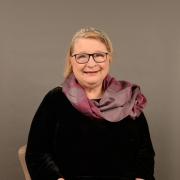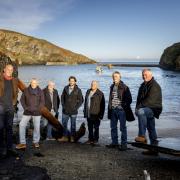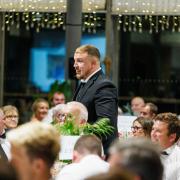Susan Griffin speaks to a singer/songwriter who uses Cornish in her songs to preserve the language.
Cornwall has never been more in vogue, which might explain why 20 years on from the Cornish language being officially recognised by the UK government, there’s not only a continued interest in the ancient Celtic dialect, but it’s become increasingly popular.
Undoubtedly, the rise of online classes and events, where people can discover, learn, and use Cornish, has been a contributing factor, but whatever the reasons, the singer-songwriter Gwenno, who releases her second Cornish album Tresor this summer, is thrilled by the renaissance.
Gwenno
“It’s so inspiring, and just really beautiful to see because it’s grounded in a community of people who didn’t want to let go of such a huge part of Cornish identity,” says Gwenno who’s witnessed a change in perception since she started performing in pubs two decades ago.
“People didn’t even know there was a language and would ask me what I was doing, and that’s because the language wasn’t visible. The tiny amount of funding that existed for a short while has made all the difference, but there needs to be more because the language connects people with their past, to their ancestors. It’s one of the elements that makes Cornwall so special and interesting.”
Although Gwenno was born in Wales, she was raised a Cornish speaker by her father, the poet Tim Saunders, who’s from St Tudy in North Cornwall.
“On a personal level, I like how Cornish sounds, and how it makes me feel when I make the sounds. There’s also an expression and directness of the language I love,” explains Gwenno who uses Cornish every day with friends, family, and through her social media channels.
“It’s my home language, alongside Welsh, which it’s related to, but I don’t think it’s particularly unusual to have a home language of somewhere you haven’t been raised.
“We’re a multilingual, multicultural nation, and the reaction I get from people when I tour is so positive because people are interested in different ways of seeing the world,” says the singer who was raised in a household that celebrated diverse languages, sounds, and cultures.
“My dad’s a bit of a linguist, and my mum’s belonged to a socialist street choir for 40 years, so that was a big influence on the usefulness of music. My uncle was an organist and a brilliant piano teacher, and I was also an Irish dancer, so heard all the traditional folk tunes. It means I saw music being used for reasons other than commercial pop music. It also felt like music was an endless source of inspiration, which is what I like because I’m driven by curiosity.”
%image(15711276, type="article-full", alt="Although Gwenno was born in Wales, she was raised a Cornish speaker by her father, the poet Tim Saunders.")
Gwenno released her first album, the Welsh language Y Dydd Olaf in 2015, followed by Le Kov (A Place of Memory) in 2018, which was recorded almost entirely in Cornish.
“When I became a mum, I had to really think about whether I was going to pass the language onto my son and decided I would. That really influenced making Le Kov, in a way, because it was about solidifying the culture that was a big part of my life, and trying to get to know it better,” explains Gwenno who describes Le Kov as “a collection of memories, and things that had been passed down from my dad”.
“As a family, we couldn’t afford to visit Cornwall too often but when we did, we only went to see Cornish speakers, which was really great because it gave me this impression of a language which is alive, and vibrant.”
There are of course nods to the Cornish language throughout Cornwall, from house names to street signs, and Kernow, the Cornish word for Cornwall is widely used, but it’s possible to live in the county all your life, and never hear the language spoken.
For that reason, song is an accessible way for people to hear and appreciate Cornish, or Kernewek, particularly for the first time.
“Music’s a great way to share a language and culture. It’s what we understand best, and it’s a brilliant vessel for a multitude of expressions,” says Gwenno who discovered a new-found confidence for the creative use of Cornish following Le Kov.
“It’s why I wanted to use it again to explore emotions and desires, rather than it being songs about the language or history, and this time I wanted to write in Cornwall, so I’m not imagining the place, I’m there reacting to it.”
And so, in January 2020, she headed to St Ives to write the album, before developing and recording it back home in Cardiff, alongside Rhys Edwards, her musical collaborator.
This period coincided with the pandemic and nationwide lockdowns, and Gwenno reveals the sheer scale of events meant they “froze initially”.
“I think it was difficult for a lot of artists to know how to react to the chaos happening and wondering how to be useful, those thoughts of what is the point of what I do? What value does it have when lives have to be saved? What is the point of art in general? But you realise escapism is really important.
“Also, there’s been so much noise in the world, we wanted to make something really quiet and beautiful. There’s something reassuring and comforting about that.”
Tresor, which means Treasure, is not only an intimate and introspective album, but one that poignantly reflects our shared experience.
“I’m really interested in the idea of collective conscious, and constantly trying to tap into that to try and express it. This album is about how powerful the imagination is, how it’s our best asset as human beings, and something technology can’t emulate. It’s also about emotions, desires, life and death, all these things we’ve been dealing with,” says Gwenno who’s wholly committed to producing another album in Cornish.
“I find the language so inspiring to use, and Tresor has helped me express myself through it, which is so exciting. There’s a lot I’d like to explore, so I’m just starting really.”
Tresor is out July 1. More details here.
%image(15711277, type="article-full", alt="Gwenno reflects on her new music: "I’m really interested in the idea of collective conscious, and constantly trying to tap into that to try and express it."")
Keeping Cornish Alive
It’s thought there are around 600 fluent Cornish speakers, and a growing number of people keen, and able, to learn Cornish around the world.
“In the Cornish class I go to each week in Truro, there’s a lady in America who attends online, and a chap from Spain. There’s also a teacher in Redruth who holds a class specifically for Australians due to the time difference,” says Emma Jenkin, a coordinator for Kowethas an Yeth Kernewek, a charity that promotes Cornish language in the community through books and events.
“In a way the pandemic has opened Cornish up to a lot of people because things went online, and thankfully there are many people who are passionate about the language. Having said that, there’s very little funding, which makes it difficult to plan anything other than short-term projects,” notes Emma.
Despite the challenges, she remains hopeful the Cornish language will survive for future generations and is heartened by the work being carried out by Golden Tree, in conjunction with Cornwall Council, to promote Cornish in schools.
“I think people are more positive about the language than they ever have been,” says Emma. “In the past, people couldn’t see the point, or it was seen as something for linguists and academics but as the profile of Cornwall has been raised, the culture has been greater appreciated, which carries over to the language as well.”
Find a class near you here via Cornwall Council’s Cornish Language Office.



























